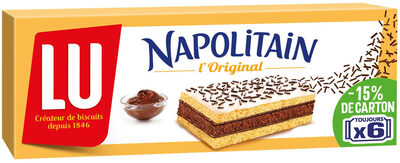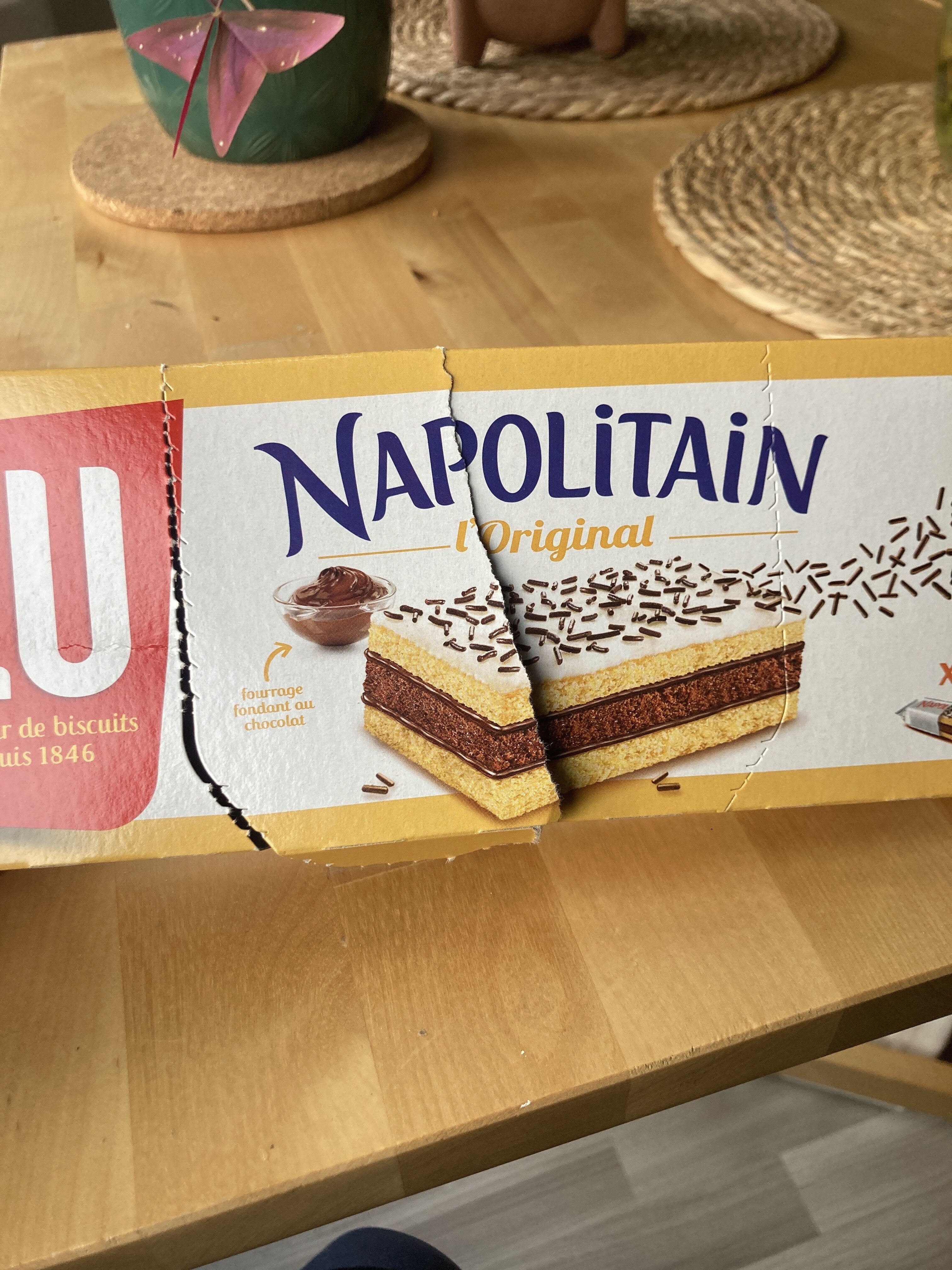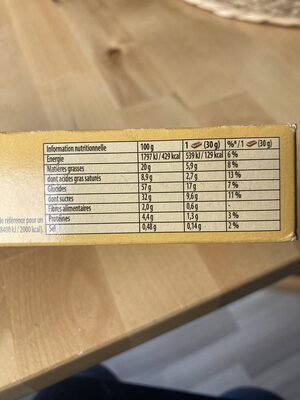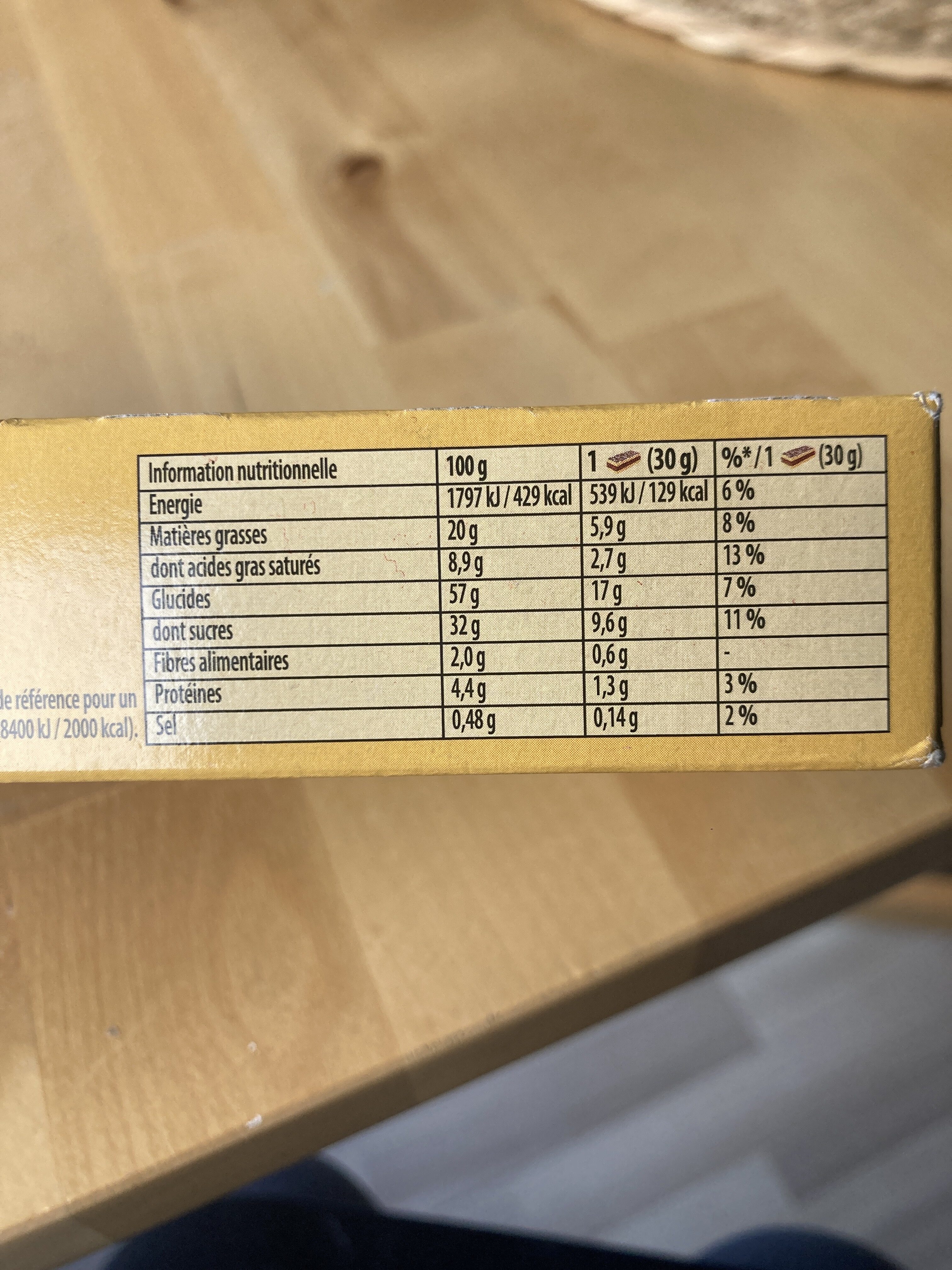Help us make food transparency the norm!
As a non-profit organization, we depend on your donations to continue informing consumers around the world about what they eat.
The food revolution starts with you!
Napolitain - L'original - LU - 180 g (6 x 30 g)
Napolitain - L'original - LU - 180 g (6 x 30 g)
Barcode: 7622201809638 (EAN / EAN-13)
Common name: Gâteau fourrage au chocolat
Quantity: 180 g (6 x 30 g)
Packaging: Plastic, Cardboard, Bag, Dry, Individual bag, Sleeve
Brands: LU, Napolitain, Mondelez
Categories: Snacks, Sweet snacks, Biscuits and cakes, Cakes, Filled sponge cake slices
Labels, certifications, awards:
Distributor labels, Charte LU Harmony, Made in France, Pure cocoa butter, Triman
Origin of ingredients: France, European Union and Non European Union
Manufacturing or processing places: France, Jussy
Link to the product page on the official site of the producer: https://www.lu.fr/napolitain/produit/nap...
Stores: Carrefour, Auchan, carrefour.fr
Countries where sold: France
Matching with your preferences
Health
Ingredients
-
40 ingredients
wheat flour 24%, sugar, palm oil, glucose-fructose syrup, eggs 7.5%, chocolate powder 6.5% (sugar, cocoa powder), stabilizers (glycerol, sorbitol), whey powder (milk), starches, glucose syrup, flavourings (contains alcohol), lean cocoa powder, rapeseed oil, baking powders (ammonium carbonates, diphosphates, sodium carbonates), cocoa butter, salt, shea fat, skimmed milk powder, emulsifiers (e472b, e472a, soy lecithins, e471, e473), thickener (xanthan gum), dye (e160a), concentrated butter, acidity regulators (sodium citrates, citric acid, tartaric acid), preservative (potassium sorbate)Allergens: Eggs, Gluten, Milk, SoybeansTraces: Nuts
Food processing
-
Ultra processed foods
Elements that indicate the product is in the 4 - Ultra processed food and drink products group:
- Additive: E160a - Carotene
- Additive: E322 - Lecithins
- Additive: E415 - Xanthan gum
- Additive: E420 - Sorbitol
- Additive: E422 - Glycerol
- Additive: E450 - Diphosphates
- Additive: E471 - Mono- and diglycerides of fatty acids
- Additive: E472a - Acetic acid esters of mono- and diglycerides of fatty acids
- Additive: E472b - Lactic acid esters of mono- and diglycerides of fatty acids
- Ingredient: Colour
- Ingredient: Emulsifier
- Ingredient: Flavouring
- Ingredient: Glucose
- Ingredient: Glucose syrup
- Ingredient: Thickener
- Ingredient: Whey
Food products are classified into 4 groups according to their degree of processing:
- Unprocessed or minimally processed foods
- Processed culinary ingredients
- Processed foods
- Ultra processed foods
The determination of the group is based on the category of the product and on the ingredients it contains.
Additives
-
E160a - Carotene
Carotene: The term carotene -also carotin, from the Latin carota, "carrot"- is used for many related unsaturated hydrocarbon substances having the formula C40Hx, which are synthesized by plants but in general cannot be made by animals -with the exception of some aphids and spider mites which acquired the synthesizing genes from fungi-. Carotenes are photosynthetic pigments important for photosynthesis. Carotenes contain no oxygen atoms. They absorb ultraviolet, violet, and blue light and scatter orange or red light, and -in low concentrations- yellow light. Carotenes are responsible for the orange colour of the carrot, for which this class of chemicals is named, and for the colours of many other fruits, vegetables and fungi -for example, sweet potatoes, chanterelle and orange cantaloupe melon-. Carotenes are also responsible for the orange -but not all of the yellow- colours in dry foliage. They also -in lower concentrations- impart the yellow coloration to milk-fat and butter. Omnivorous animal species which are relatively poor converters of coloured dietary carotenoids to colourless retinoids have yellowed-coloured body fat, as a result of the carotenoid retention from the vegetable portion of their diet. The typical yellow-coloured fat of humans and chickens is a result of fat storage of carotenes from their diets. Carotenes contribute to photosynthesis by transmitting the light energy they absorb to chlorophyll. They also protect plant tissues by helping to absorb the energy from singlet oxygen, an excited form of the oxygen molecule O2 which is formed during photosynthesis. β-Carotene is composed of two retinyl groups, and is broken down in the mucosa of the human small intestine by β-carotene 15‚15'-monooxygenase to retinal, a form of vitamin A. β-Carotene can be stored in the liver and body fat and converted to retinal as needed, thus making it a form of vitamin A for humans and some other mammals. The carotenes α-carotene and γ-carotene, due to their single retinyl group -β-ionone ring-, also have some vitamin A activity -though less than β-carotene-, as does the xanthophyll carotenoid β-cryptoxanthin. All other carotenoids, including lycopene, have no beta-ring and thus no vitamin A activity -although they may have antioxidant activity and thus biological activity in other ways-. Animal species differ greatly in their ability to convert retinyl -beta-ionone- containing carotenoids to retinals. Carnivores in general are poor converters of dietary ionone-containing carotenoids. Pure carnivores such as ferrets lack β-carotene 15‚15'-monooxygenase and cannot convert any carotenoids to retinals at all -resulting in carotenes not being a form of vitamin A for this species-; while cats can convert a trace of β-carotene to retinol, although the amount is totally insufficient for meeting their daily retinol needs.Source: Wikipedia
-
E202 - Potassium sorbate
Potassium sorbate (E202) is a synthetic food preservative commonly used to extend the shelf life of various food products.
It works by inhibiting the growth of molds, yeast, and some bacteria, preventing spoilage. When added to foods, it helps maintain their freshness and quality.
Some studies have shown that when combined with nitrites, potassium sorbate have genotoxic activity in vitro. However, potassium sorbate is generally recognized as safe (GRAS) by regulatory authorities.
-
E322 - Lecithins
Lecithins are natural compounds commonly used in the food industry as emulsifiers and stabilizers.
Extracted from sources like soybeans and eggs, lecithins consist of phospholipids that enhance the mixing of oil and water, ensuring smooth textures in various products like chocolates, dressings, and baked goods.
They do not present any known health risks.
-
E322i - Lecithin
Lecithins are natural compounds commonly used in the food industry as emulsifiers and stabilizers.
Extracted from sources like soybeans and eggs, lecithins consist of phospholipids that enhance the mixing of oil and water, ensuring smooth textures in various products like chocolates, dressings, and baked goods.
They do not present any known health risks.
-
E330 - Citric acid
Citric acid is a natural organic acid found in citrus fruits such as lemons, oranges, and limes.
It is widely used in the food industry as a flavor enhancer, acidulant, and preservative due to its tart and refreshing taste.
Citric acid is safe for consumption when used in moderation and is considered a generally recognized as safe (GRAS) food additive by regulatory agencies worldwide.
-
E331 - Sodium citrates
Sodium citrate: Sodium citrate may refer to any of the sodium salts of citrate -though most commonly the third-: Monosodium citrate Disodium citrate Trisodium citrateThe three forms of the salt are collectively known by the E number E331. Sodium citrates are used as acidity regulators in food and drinks, and also as emulsifiers for oils. They enable cheeses to melt without becoming greasy.Source: Wikipedia
-
E415 - Xanthan gum
Xanthan gum (E415) is a natural polysaccharide derived from fermented sugars, often used in the food industry as a thickening and stabilizing agent.
This versatile food additive enhances texture and prevents ingredient separation in a wide range of products, including salad dressings, sauces, and gluten-free baked goods.
It is considered safe for consumption even at high intake amounts.
-
E420 - Sorbitol
Sorbitol: Sorbitol --, less commonly known as glucitol --, is a sugar alcohol with a sweet taste which the human body metabolizes slowly. It can be obtained by reduction of glucose, which changes the aldehyde group to a hydroxyl group. Most sorbitol is made from corn syrup, but it is also found in nature, for example in apples, pears, peaches, and prunes. It is converted to fructose by sorbitol-6-phosphate 2-dehydrogenase. Sorbitol is an isomer of mannitol, another sugar alcohol; the two differ only in the orientation of the hydroxyl group on carbon 2. While similar, the two sugar alcohols have very different sources in nature, melting points, and uses.Source: Wikipedia
-
E422 - Glycerol
Glycerol: Glycerol -; also called glycerine or glycerin; see spelling differences- is a simple polyol compound. It is a colorless, odorless, viscous liquid that is sweet-tasting and non-toxic. The glycerol backbone is found in all lipids known as triglycerides. It is widely used in the food industry as a sweetener and humectant and in pharmaceutical formulations. Glycerol has three hydroxyl groups that are responsible for its solubility in water and its hygroscopic nature.Source: Wikipedia
-
E450 - Diphosphates
Diphosphates (E450) are food additives often utilized to modify the texture of products, acting as leavening agents in baking and preventing the coagulation of canned food.
These salts can stabilize whipped cream and are also found in powdered products to maintain their flow properties. They are commonly present in baked goods, processed meats, and soft drinks.
Derived from phosphoric acid, they're part of our daily phosphate intake, which often surpasses recommended levels due to the prevalence of phosphates in processed foods and drinks.
Excessive phosphate consumption is linked to health issues, such as impaired kidney function and weakened bone health. Though diphosphates are generally regarded as safe when consumed within established acceptable daily intakes, it's imperative to monitor overall phosphate consumption to maintain optimal health.
-
E471 - Mono- and diglycerides of fatty acids
Mono- and diglycerides of fatty acids (E471), are food additives commonly used as emulsifiers in various processed foods.
These compounds consist of glycerol molecules linked to one or two fatty acid chains, which help stabilize and blend water and oil-based ingredients. E471 enhances the texture and shelf life of products like margarine, baked goods, and ice cream, ensuring a smooth and consistent texture.
It is generally considered safe for consumption within established regulatory limits.
-
E500 - Sodium carbonates
Sodium carbonates (E500) are compounds commonly used in food preparation as leavening agents, helping baked goods rise by releasing carbon dioxide when they interact with acids.
Often found in baking soda, they regulate the pH of food, preventing it from becoming too acidic or too alkaline. In the culinary world, sodium carbonates can also enhance the texture and structure of foods, such as noodles, by modifying the gluten network.
Generally recognized as safe, sodium carbonates are non-toxic when consumed in typical amounts found in food.
-
E503 - Ammonium carbonates
Ammonium carbonate: Ammonium carbonate is a salt with the chemical formula -NH4-2CO3. Since it readily degrades to gaseous ammonia and carbon dioxide upon heating, it is used as a leavening agent and also as smelling salt. It is also known as baker's ammonia and was a predecessor to the more modern leavening agents baking soda and baking powder. It is a component of what was formerly known as sal volatile and salt of hartshorn.Source: Wikipedia
Ingredients analysis
-
Palm oil
Ingredients that contain palm oil: Palm oil
-
Non-vegan
Non-vegan ingredients: Egg, Whey powder, Skimmed milk powder, ButterfatSome ingredients could not be recognized.
We need your help!
You can help us recognize more ingredients and better analyze the list of ingredients for this product and others:
- Edit this product page to correct spelling mistakes in the ingredients list, and/or to remove ingredients in other languages and sentences that are not related to the ingredients.
- Add new entries, synonyms or translations to our multilingual lists of ingredients, ingredient processing methods, and labels.
If you would like to help, join the #ingredients channel on our Slack discussion space and/or learn about ingredients analysis on our wiki. Thank you!
-
Vegetarian status unknown
Unrecognized ingredients: fr:graisse-de-kariteSome ingredients could not be recognized.
We need your help!
You can help us recognize more ingredients and better analyze the list of ingredients for this product and others:
- Edit this product page to correct spelling mistakes in the ingredients list, and/or to remove ingredients in other languages and sentences that are not related to the ingredients.
- Add new entries, synonyms or translations to our multilingual lists of ingredients, ingredient processing methods, and labels.
If you would like to help, join the #ingredients channel on our Slack discussion space and/or learn about ingredients analysis on our wiki. Thank you!
-
Details of the analysis of the ingredients
We need your help!
Some ingredients could not be recognized.
We need your help!
You can help us recognize more ingredients and better analyze the list of ingredients for this product and others:
- Edit this product page to correct spelling mistakes in the ingredients list, and/or to remove ingredients in other languages and sentences that are not related to the ingredients.
- Add new entries, synonyms or translations to our multilingual lists of ingredients, ingredient processing methods, and labels.
If you would like to help, join the #ingredients channel on our Slack discussion space and/or learn about ingredients analysis on our wiki. Thank you!
fr: Farine de blé, Sucre, Huile de palme, Sirop de glucose-fructose, Œufs, Chocolat en poudre (Sucre, Poudre de cacao), Stabilisants (Glycérol, Sorbitols), Lactosérum en poudre, Alcool, Sirop de glucose, Cacao maigre en poudre, Poudres à lever (Carbonates d'ammonium, Diphosphates, Carbonates de sodium), Huile de colza, Graisse de karité, Sel, Arômes, Amidon, Émulsifiants (e472b, e472a, Lécithines de soja, e471), Lait écrémé en poudre, colorant (e160a), Épaississant (Gomme xanthane), Beurre concentré, Correcteurs d'acidité (Citrates de sodium, Acide citrique), Conservateur (Sorbate de potassium)- Farine de blé -> en:wheat-flour - vegan: yes - vegetarian: yes - ciqual_proxy_food_code: 9410 - percent_min: 4.16666666666667 - percent_max: 100
- Sucre -> en:sugar - vegan: yes - vegetarian: yes - ciqual_proxy_food_code: 31016 - percent_min: 0 - percent_max: 32
- Huile de palme -> en:palm-oil - vegan: yes - vegetarian: yes - from_palm_oil: yes - ciqual_food_code: 16129 - percent_min: 0 - percent_max: 32
- Sirop de glucose-fructose -> en:glucose-fructose-syrup - vegan: yes - vegetarian: yes - ciqual_food_code: 31077 - percent_min: 0 - percent_max: 25
- Œufs -> en:egg - vegan: no - vegetarian: yes - ciqual_food_code: 22000 - percent_min: 0 - percent_max: 20
- Chocolat en poudre -> en:chocolate-powder - vegan: maybe - vegetarian: yes - ciqual_food_code: 18101 - percent_min: 0 - percent_max: 16.6666666666667
- Sucre -> en:sugar - vegan: yes - vegetarian: yes - ciqual_proxy_food_code: 31016 - percent_min: 0 - percent_max: 16.6666666666667
- Poudre de cacao -> en:cocoa-powder - vegan: yes - vegetarian: yes - ciqual_food_code: 18100 - percent_min: 0 - percent_max: 8.33333333333333
- Stabilisants -> en:stabiliser - percent_min: 0 - percent_max: 14.2857142857143
- Glycérol -> en:e422 - vegan: maybe - vegetarian: maybe - percent_min: 0 - percent_max: 14.2857142857143
- Sorbitols -> en:e420 - vegan: yes - vegetarian: yes - percent_min: 0 - percent_max: 7.14285714285714
- Lactosérum en poudre -> en:whey-powder - vegan: no - vegetarian: maybe - percent_min: 0 - percent_max: 12.5
- Alcool -> en:alcohol - vegan: maybe - vegetarian: yes - ciqual_food_code: 1014 - percent_min: 0 - percent_max: 11.1111111111111
- Sirop de glucose -> en:glucose-syrup - vegan: yes - vegetarian: yes - ciqual_proxy_food_code: 31016 - percent_min: 0 - percent_max: 10
- Cacao maigre en poudre -> en:fat-reduced-cocoa-powder - vegan: yes - vegetarian: yes - ciqual_food_code: 18100 - percent_min: 0 - percent_max: 9.09090909090909
- Poudres à lever -> en:raising-agent - percent_min: 0 - percent_max: 8.33333333333333
- Carbonates d'ammonium -> en:e503 - vegan: yes - vegetarian: yes - percent_min: 0 - percent_max: 8.33333333333333
- Diphosphates -> en:e450 - vegan: yes - vegetarian: yes - percent_min: 0 - percent_max: 4.16666666666667
- Carbonates de sodium -> en:e500 - vegan: yes - vegetarian: yes - percent_min: 0 - percent_max: 2.77777777777778
- Huile de colza -> en:colza-oil - vegan: yes - vegetarian: yes - from_palm_oil: no - ciqual_food_code: 17130 - percent_min: 0 - percent_max: 7.69230769230769
- Graisse de karité -> fr:graisse-de-karite - percent_min: 0 - percent_max: 7.14285714285714
- Sel -> en:salt - vegan: yes - vegetarian: yes - ciqual_food_code: 11058 - percent_min: 0 - percent_max: 0.48
- Arômes -> en:flavouring - vegan: maybe - vegetarian: maybe - percent_min: 0 - percent_max: 0.48
- Amidon -> en:starch - vegan: yes - vegetarian: yes - ciqual_proxy_food_code: 9510 - percent_min: 0 - percent_max: 0.48
- Émulsifiants -> en:emulsifier - percent_min: 0 - percent_max: 0.48
- e472b -> en:e472b - vegan: maybe - vegetarian: maybe - from_palm_oil: maybe - percent_min: 0 - percent_max: 0.48
- e472a -> en:e472a - vegan: maybe - vegetarian: maybe - from_palm_oil: maybe - percent_min: 0 - percent_max: 0.24
- Lécithines de soja -> en:soya-lecithin - vegan: yes - vegetarian: yes - ciqual_food_code: 42200 - percent_min: 0 - percent_max: 0.16
- e471 -> en:e471 - vegan: maybe - vegetarian: maybe - from_palm_oil: maybe - percent_min: 0 - percent_max: 0.12
- Lait écrémé en poudre -> en:skimmed-milk-powder - vegan: no - vegetarian: yes - ciqual_food_code: 19054 - percent_min: 0 - percent_max: 0.48
- colorant -> en:colour - percent_min: 0 - percent_max: 0.48
- e160a -> en:e160a - vegan: maybe - vegetarian: maybe - from_palm_oil: maybe - percent_min: 0 - percent_max: 0.48
- Épaississant -> en:thickener - percent_min: 0 - percent_max: 0.48
- Gomme xanthane -> en:e415 - vegan: yes - vegetarian: yes - percent_min: 0 - percent_max: 0.48
- Beurre concentré -> en:butterfat - vegan: no - vegetarian: yes - from_palm_oil: maybe - ciqual_food_code: 16401 - percent_min: 0 - percent_max: 0.48
- Correcteurs d'acidité -> en:acidity-regulator - percent_min: 0 - percent_max: 0.48
- Citrates de sodium -> en:e331 - vegan: yes - vegetarian: yes - percent_min: 0 - percent_max: 0.48
- Acide citrique -> en:e330 - vegan: yes - vegetarian: yes - percent_min: 0 - percent_max: 0.24
- Conservateur -> en:preservative - percent_min: 0 - percent_max: 0.48
- Sorbate de potassium -> en:e202 - vegan: yes - vegetarian: yes - percent_min: 0 - percent_max: 0.48
Nutrition
-
Bad nutritional quality
⚠ ️Warning: the amount of fruits, vegetables and nuts is not specified on the label, it was estimated from the list of ingredients: 0This product is not considered a beverage for the calculation of the Nutri-Score.
Positive points: 2
- Proteins: 2 / 5 (value: 4.4, rounded value: 4.4)
- Fiber: 2 / 5 (value: 2, rounded value: 2)
- Fruits, vegetables, nuts, and colza/walnut/olive oils: 0 / 5 (value: 0.0155843098958286, rounded value: 0)
Negative points: 22
- Energy: 5 / 10 (value: 1797, rounded value: 1797)
- Sugars: 7 / 10 (value: 32, rounded value: 32)
- Saturated fat: 8 / 10 (value: 8.9, rounded value: 8.9)
- Sodium: 2 / 10 (value: 192, rounded value: 192)
The points for proteins are not counted because the negative points are greater or equal to 11.
Nutritional score: (22 - 2)
Nutri-Score:
-
Nutrient levels
-
Fat in moderate quantity (20%)
What you need to know- A high consumption of fat, especially saturated fats, can raise cholesterol, which increases the risk of heart diseases.
Recommendation: Limit the consumption of fat and saturated fat- Choose products with lower fat and saturated fat content.
-
Saturated fat in high quantity (8.9%)
What you need to know- A high consumption of fat, especially saturated fats, can raise cholesterol, which increases the risk of heart diseases.
Recommendation: Limit the consumption of fat and saturated fat- Choose products with lower fat and saturated fat content.
-
Sugars in high quantity (32%)
What you need to know- A high consumption of sugar can cause weight gain and tooth decay. It also augments the risk of type 2 diabetes and cardio-vascular diseases.
Recommendation: Limit the consumption of sugar and sugary drinks- Sugary drinks (such as sodas, fruit beverages, and fruit juices and nectars) should be limited as much as possible (no more than 1 glass a day).
- Choose products with lower sugar content and reduce the consumption of products with added sugars.
-
Salt in moderate quantity (0.48%)
What you need to know- A high consumption of salt (or sodium) can cause raised blood pressure, which can increase the risk of heart disease and stroke.
- Many people who have high blood pressure do not know it, as there are often no symptoms.
- Most people consume too much salt (on average 9 to 12 grams per day), around twice the recommended maximum level of intake.
Recommendation: Limit the consumption of salt and salted food- Reduce the quantity of salt used when cooking, and don't salt again at the table.
- Limit the consumption of salty snacks and choose products with lower salt content.
-
-
Nutrition facts
Nutrition facts As sold
for 100 g / 100 mlPrepared
for 100 g / 100 mlPrepared
per serving (30 g)Compared to: Filled sponge cake slices Energy 1,797 kj
(429 kcal)1,800 kj
(430 kcal)539 kj
(129 kcal)+4% Fat 20 g 19.7 g 5.9 g +8% Saturated fat 8.9 g 9 g 2.7 g -8% Carbohydrates 57 g 60 g 18 g +4% Sugars 32 g 32.7 g 9.8 g -10% Fiber 2 g 2 g 0.6 g +8% Proteins 4.4 g 4.33 g 1.3 g -17% Salt 0.48 g 0.267 g 0.08 g +23% Fruits‚ vegetables‚ nuts and rapeseed‚ walnut and olive oils (estimate from ingredients list analysis) 0.016 % ? ?
Environment
-
Eco-Score not computed - Unknown environmental impact
We could not compute the Eco-Score of this product as it is missing some data, could you help complete it?Could you add a precise product category so that we can compute the Eco-Score? Add a category
Packaging
-
Packaging with a medium impact
-
Packaging parts
1 x Sleeve (Cardboard)
6 x Individual bag (Plastic)
-
Packaging materials
Material % Packaging weight Packaging weight per 100 g of product Paper or cardboard Plastic Total
-
Transportation
-
Origins of ingredients
Origins of ingredients with a high impact
Origin of the product and/or its ingredients % of ingredients Impact European Union and Non European Union 50 %High France 50 %Medium
Threatened species
-
Contains palm oil
Drives deforestation and threatens species such as the orangutan
Tropical forests in Asia, Africa and Latin America are destroyed to create and expand oil palm tree plantations. The deforestation contributes to climate change, and it endangers species such as the orangutan, the pigmy elephant and the Sumatran rhino.
Report a problem
-
Incomplete or incorrect information?
Category, labels, ingredients, allergens, nutritional information, photos etc.
If the information does not match the information on the packaging, please complete or correct it. Open Food Facts is a collaborative database, and every contribution is useful for all.
Data sources
Product added on by kiliweb
Last edit of product page on by kikimadit.
Product page also edited by 2potsdemiel, chevalstar, danizavtz, driveoff, ecoscore-impact-estimator, freezer, grumpf, halal-app-chakib, hungergames, inf, lauthu, moon-rabbit, n-boidin1, off.572c58b4-811a-4b13-b83a-be8faa400585, off.a31ba885-25b5-4357-b07b-3b919572fb1f, openfoodfacts-contributors, pr29, quechoisir, roboto-app, smoothie-app, super-pj, teolemon, yuka.sY2b0xO6T85zoF3NwEKvllRcUNf5jh7qKEfioHWm69KkcKbCbs5Jw6nlb6s, yuka.sY2b0xO6T85zoF3NwEKvlmd-TYvesB_jExrUs0OyzNGWKLj1f8hb45n8Hqo.












